
On May 13, 2020, senior UAE diplomatic and cultural officials joined with UAE and US faith leaders in a virtual gathering to reflect on the importance of faith and community as the world’s Muslims celebrated Ramadan amidst the most challenging of times. The discussion came one day in advance of the special day of prayer announced by the Higher Committee of Human Fraternity with the support of Pope Francis, Grand Imam of Al Azhar Dr. Ahmed el-Tayeb and UN Secretary-General António Guterres.
Since before the country’s founding in 1971, UAE society has encouraged tolerance and inclusion. The UAE is home to a diverse population of 200 nationalities and practitioners of numerous faiths who live and worship side-by-side.
In the face of the ongoing COVID-19 pandemic, faith communities in the UAE are balancing public health and religious practice. Though the UAE has temporarily suspended public prayer gatherings, faith communities are finding new ways to practice their faiths. During Ramadan, technology has allowed those observing Islam’s holiest month to connect despite social distancing constraints, including through hosting virtual iftars.
The content below provides additional information about the UAE’s tradition of religious inclusion, Pope Francis’ 2019 visit to Abu Dhabi and the Abrahamic Family House initiative.
Learn More
Abrahamic Family House
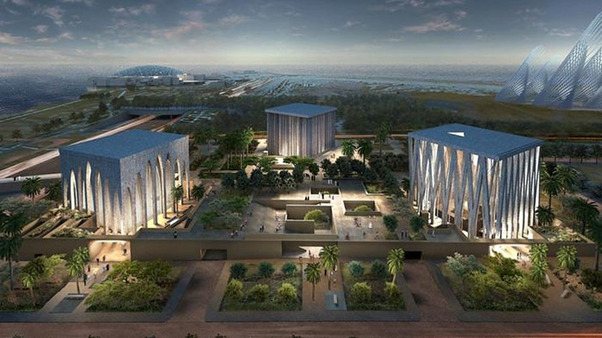
Including a church, mosque and synagogue, the Abrahamic Family House in Abu Dhabi will be a place of learning, dialogue and worship, focused on creating mutual understanding among people of all faiths and belief systems.
The vision for the interfaith center emerged following the visit of His Holiness Pope Francis to the UAE in February 2019, when the Pope joined with Dr. Ahmed el-Tayeb, the Grand Imam of Al-Azhar, to sign the Document on Human Fraternity for World Peace and Living Together.
A reflection of the values highlighted in the Document, the Abrahamic House will serve as a powerful platform for inspiring and nurturing understanding and acceptance between people of goodwill.
Rabbi Bruce Lustig, a member of the Higher Committee of Human Fraternity – an international body that provides counsel on the Abrahamic Family House – said the project “will help build bridges between religious leaders and communities as well as foster peace and harmony in an era that is too often defined by difference.”
The complex will be located on Saadiyat Island in Abu Dhabi. The three main buildings will each lead to a central garden for collaboration and informal gatherings. The site will also include a museum and center for education. The mosque, church and synagogue will be the same height, but the design and interior of each religious structure will be significantly different.
Renowned British architect Sir David Adjaye, who also designed the Smithsonian Institution National Museum of African American History and Culture in Washington, DC, won the competition to design the complex. He commented: “Built in the UAE's capital, the space will be open to the world, and our hope is that through these buildings people of all faiths and from across society can learn and engage in a mission of peaceful coexistence for generations to come.”
The Abrahamic Family House is currently under construction with an anticipated completion date in 2022.
Welcoming Pope Francis
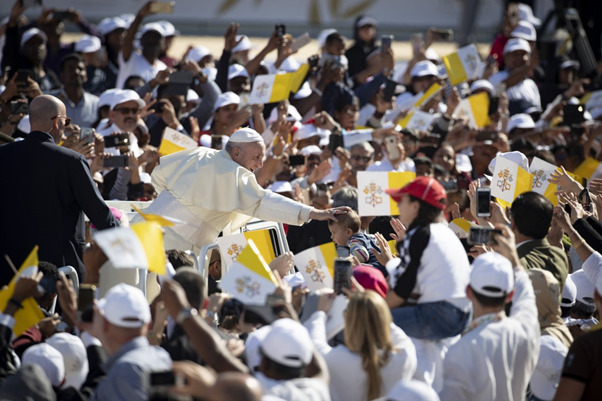
In February 2019, His Holiness Pope Francis made a historic visit to the UAE. It was the first ever visit by a sitting pope to the Arabian Peninsula – the birthplace of Islam. This momentous occasion reflected the UAE’s openness and commitment to inclusivity and freedom of worship.
Highlights from the trip included:
On the occasion of Pope Francis’ visit, the UAE announced plans to create the Abrahamic Family House in Abu Dhabi to celebrate peaceful coexistence among different faiths.
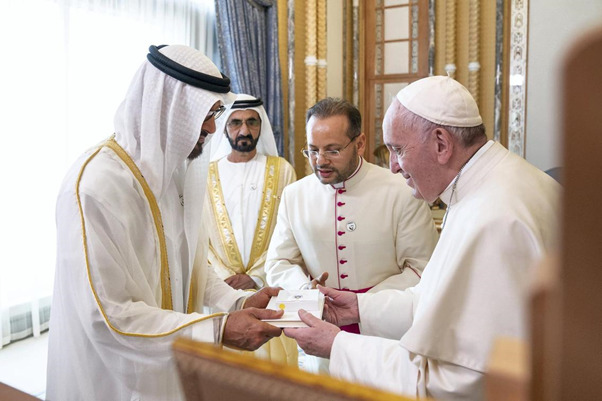
The visit came about after HH Sheikh Abdullah bin Zayed Al Nahyan, Minister of Foreign Affairs, delivered an in-person invitation to Pope Francis on behalf of the UAE in June 2018. Sheikh Mohamed, meanwhile, visited the Vatican in 2016, meeting with Pope Francis to discuss ways to solve pressing global challenges and enhance interfaith cooperation.
To mark the first-ever visit to the Arabian Peninsula by a sitting Pontiff, UAE Ambassador to the US Yousef Al Otaiba wrote that, “The pope’s visit [sends] a strong signal across the region and world: People with different beliefs can live, work and worship together.”
The UAE has welcomed Catholics and Christians of all kinds since even before the unification of the Emirates in 1971. The first Roman Catholic mass was held in Abu Dhabi in 1960. Almost 60 years later, nearly one million Catholics live and worship freely in the UAE, with congregations comprised of worshipers from around the world. Paul Hinder, Catholic Bishop to Southern Arabia, has called His Holiness Pope Francis’ historic February 2019 visit to the UAE “a step forward in the relationship between the Catholic Church and the Muslim world.”
Key Links
The UAE's Progressive Vision
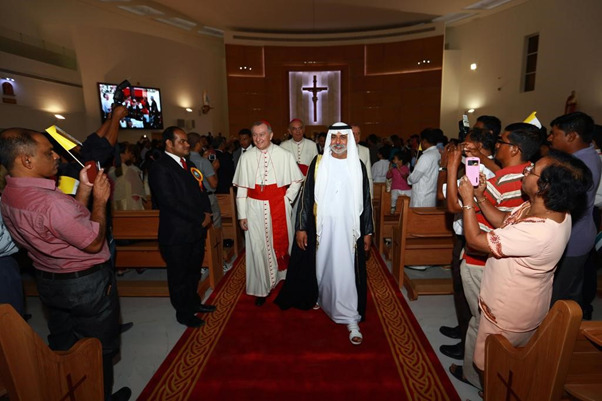
The UAE has a new vision for the Middle East region — an alternative, future-oriented model that supports moderate Islam, empowers women, embraces diversity, encourages innovation and welcomes global engagement. These values have been ingrained in the UAE's DNA since the country's founding in 1971. It explains why over 200 nationalities call the UAE home and why different religions have built approximately 40 churches, two Hindu temples, a Sikh temple and a Buddhist temple, which welcome multi-national congregations. In April 2020, the Church of Jesus Christ of Latter-day Saints announced plans to build a temple in the UAE, its first in the Middle East.
The region’s largest Anglican Church, meanwhile, is currently being built in Abu Dhabi and will accommodate more than 4,000 worshipers once complete. And in 2017, Sheikh Mohamed renamed a mosque in Abu Dhabi to “Mary, Mother of Jesus” to build stronger understanding between Christians and Muslims.
The UAE government is committed to encouraging values of inclusion and coexistence. The Ministry of Tolerance, led by His Excellency Sheikh Nahyan bin Mubarak Al Nahyan, implements programs that foster respect, peaceful coexistence and mutual understanding among people in the UAE. The UAE is celebrating 2019 as the “Year of Tolerance.”
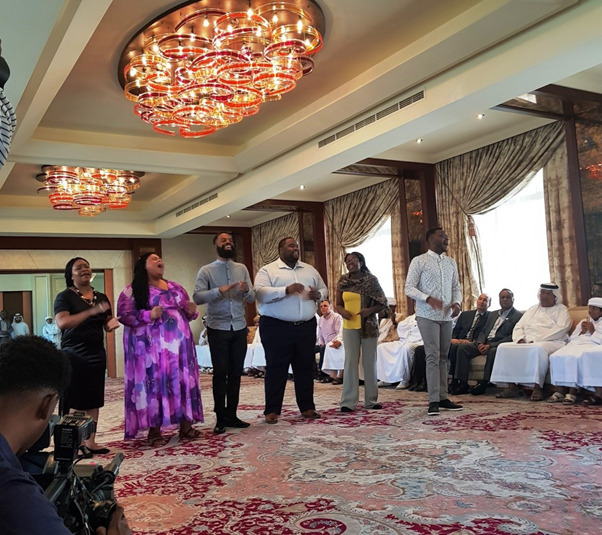
Numerous UAE-US collaborations underscore shared principles of inclusion and mutual respect.
In 2018, the Ministry of Tolerance worked with the US Embassy in the UAE to host the Reginald Golden Singers, a musical group affiliated with the Howard University Gospel Choir. The group performed to diverse audiences throughout the UAE.
In addition, in July 2018, a delegation of Emirati government officials and UAE-based religious leaders – representing Islam, Christianity and Sikhism – attended the US Department of State’s Ministerial to Advance Religious Freedom in Washington, DC. And in the fall, US Ambassador at Large for Religious Freedom Sam Brownback attended the Forum for Promoting Peace in Abu Dhabi.
A Tradition of Inclusion
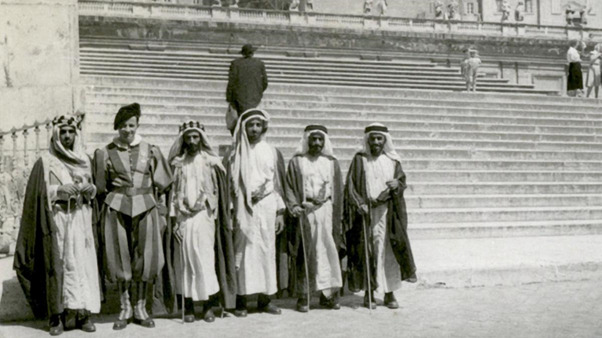
In the late 1950s, Sheikh Shakhbut, then the Ruler of Abu Dhabi, began welcoming the first communities of Christian oil and gas workers to the Arabian Gulf region. As a welcoming gesture, the government donated land for the St. Andrew’s Anglican Church, which opened in 1968.
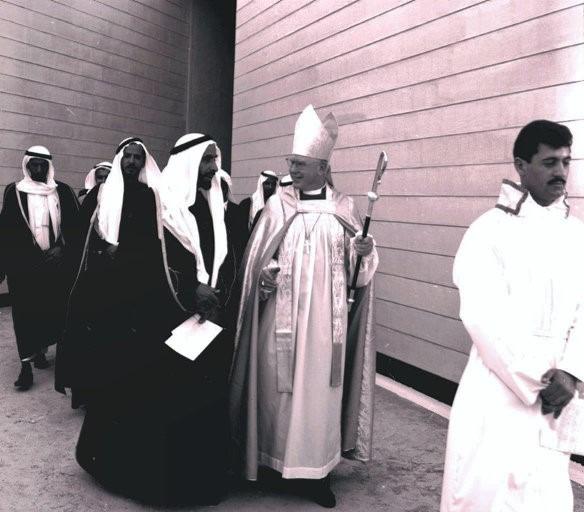
Other denominations thrived, too. In 1960, the first Roman Catholic mass was held in Abu Dhabi, followed by the opening of the St. Joseph’s Church on the Abu Dhabi Corniche in 1965 – also on land donated by the government. The UAE quickly became a model for religious inclusion in the region, with the Vatican moving the See of Southern Arabia from Aden to Abu Dhabi in the 1970s.
As the UAE continued to grow, so too did its religious diversity. Christians, Hindus, Sikhs, Buddhists, Jews and many others began to call the UAE home. Today, the UAE has 40 churches, two Hindu temples, one Sikh temple and one Buddhist temple.
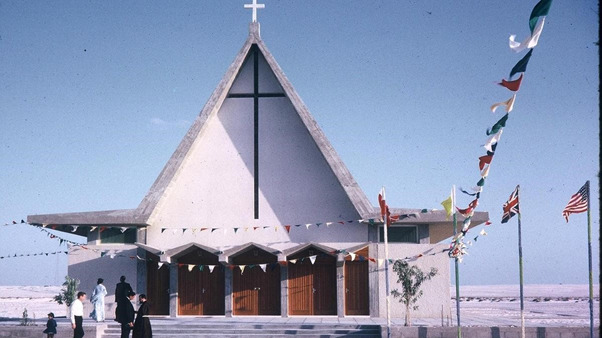
Since unification, the UAE government has consistently demonstrated its commitment to inclusion, implementing laws that protect religious freedom and programs that foster interfaith understanding. The temporary Constitution adopted in 1971 explicitly guaranteed freedom of religion to worshipers of all faiths. This guarantee was reaffirmed in 1996 when the Federal Supreme Council permanently adopted the Constitution.
In 2016, the UAE unveiled a National Tolerance Program and established a Ministry of Tolerance, now led by HE Sheikh Nahyan bin Mubarak Al Nahyan. The Ministry implements programs that foster respect, inclusion and mutual understanding among people in the UAE.
The UAE is also working with partners around the world to advance religious inclusion. The country first established diplomatic relations with the Vatican in 2007. And in 2016, HH Sheikh Mohamed bin Zayed Al Nahyan, Crown Prince of Abu Dhabi, met His Holiness Pope Francis at the Vatican to discuss shared values of inclusion and understanding. This helped lay the groundwork for the Pope’s historic 2019 visit to the UAE.
Diversity in the UAE
The United Arab Emirates is home to people from all around the world, representing more than 200 nationalities and countless different faiths. As a result, the UAE government is committed to supporting inclusion and openness within its borders and across the region.
Protecting religious freedom is a central component of these efforts, which is why the UAE Constitution guarantees freedom of worship to all people. Today, Muslims and non-
Muslims, Emiratis and non-Emiratis alike, live together peacefully in the UAE.
Islam
Over 75 percent of UAE residents are Muslim. The UAE believes in the true nature of Islam as a religion of peace and compassion. In that spirit, the UAE is committed to encouraging values of compassion and cooperation through interfaith dialogue and international partnerships.
For the last five years, Forum for Promoting Peace in Muslim Societies has held an annual conference in Abu Dhabi. More than 800 experts, religious leaders and scholars from 120 countries attended the 2018 Forum to discuss ways to further Islamic values like friendship, peace and inclusion. Meanwhile, the Abu Dhabi-based Muslim Council of Elders seeks to encourage peace and inclusion in Muslim communities worldwide.
In addition, the UAE’s commitment to helping those in need is rooted in the values of Islam. Sheikh Zayed bin Sultan Al Nahyan, Founder and first President of the UAE, drew on the compassionate teachings of Islam to shape his vision for a generous, open-minded nation.
“To treat every person no matter what his creed or race as a special soul is a mark of Islam,” Sheikh Zayed once said. The UAE continues to follow Sheikh Zayed’s example, and the nation has become a model for moderation, inclusion and generosity in the Middle East.
Christianity
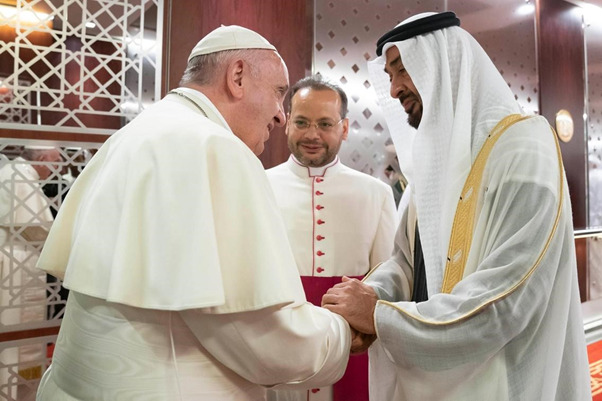
Communities of foreign Christians began arriving in the UAE in the late 1950s. The rulers of the emirates welcomed the newcomers, participating in interfaith activities and donating land for the construction of churches. In 1960, the first Roman Catholic mass was held in Abu Dhabi, followed by the opening of the St. Joseph’s Church on the Abu Dhabi Corniche in 1965. St. Andrew’s Anglican Church, which celebrated its 50th anniversary in 2018, opened nearby in 1968.
Since the UAE’s unification in 1971, the country has continued to welcome Christians from around the world. About 12.6 percent of the UAE’s population practice Christianity, and the UAE is now home to approximately 40 churches and roughly 700 ministries. In addition, the region’s largest Anglican Church is being constructed in Abu Dhabi and will accommodate more than 4,000 worshipers once complete. All of the churches stand on land donated by the ruling families of each emirate.
“The religious freedom we enjoy here is fantastic,” says Father Ani Xavier (link is external), Parish Priest of St. Paul’s Church in Mussaffah. “Everyone is respected. We are given land and the Rulers are excellent.”
In February 2019, His Holiness Pope Francis made an historic visit to the UAE, marking the first time a pope has ever visited the Arabian Peninsula. Pope Francis met with HH Sheikh Mohamed bin Zayed Al Nahyan, Crown Prince of Abu Dhabi, and the Muslim Council of Elders, continuing the UAE’s strong relationship with the Vatican.
In 2019, the UAE partnered with the UN’s heritage agency, UNESCO to become the first country in the world to restore Christian churches in Iraq destroyed by ISIS.
Although the UAE is a relatively young nation, Christianity in the Arabian Gulf region spans back centuries. In 1992, archaeologists on Sir Bani Yas Island in Abu Dhabi discovered a Christian monastery they believe was built around 600 CE. The UAE preserves the monastery today as a reminder of the Emirati people’s inclusive cultural heritage.
Hinduism
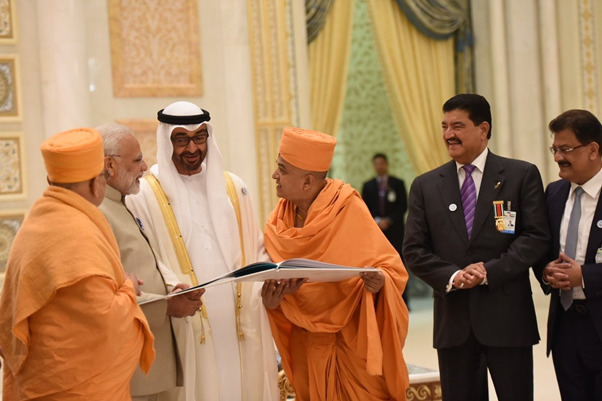
Hindus have lived in the UAE for decades, with the first Hindu temple in Dubai built as early as 1958. Roughly 6.6 percent of the UAE population practices Hinduism. Two Hindu temples now operate in Dubai, and several cremation facilities in Abu Dhabi, Dubai and Sharjah provide Hindu burial rites.
Indian Prime Minister Narendra Modi has visited the UAE twice, strengthening the bilateral relationship between India and the UAE. During his first visit in 2015, Sheikh Mohamed bin Zayed Al Nahyan, Crown Prince of Abu Dhabi, announced a land donation for Abu Dhabi’s first Hindu temple, the BAPS Shri Swaminarayan Mandir.
In 2018, Modi watched as Indian sadhus performed a stone laying ceremony to kick off the construction of the temple. When the structure is completed in 2020, it will be the first traditional Hindu stone temple in the Middle East. “It will be a holy place where humanity and harmony will unite,” said Modi.
Sikhism
About 1,000 Sikhs lived in the Emirates in 1958, many of them worshiping at Dubai’s Hindu temple. Over 60 years later, Sikhs are one of the most prominent expatriate communities in the UAE, with more than 50,000 now living in the country.
The UAE’s first Sikh temple opened in Dubai in 2012, after Mohammed bin Rashid Al Maktoum, Ruler of Dubai and Vice President of the UAE, granted land for its construction. The 100,000 square-foot facility, known as Guru Nanak Darbar, is the largest gurdwara in the Gulf region. The temple offers an array of religious, non-religious and interfaith services, and it attracts hundreds of thousands of visitors from around the world each year.
The Sikh community holds an interfaith iftar each year at Guru Nanak Darbar. People of all backgrounds, including foreign diplomats and UAE ministers, attend the annual event.
“In a world that struggles with extremism, the best way to cut it is through creating friendships among different faiths and nationalities,” explained Surender Singh Kandhari, chairman of the temple. “It is only through communication that we can overcome adversities.”
Buddhism
Roughly 500,000 Buddhists live in the UAE, most of them expatriates from Sri Lanka. Buddhists from around the UAE travel to the Mahamevnawa Buddhist Monastery in Dubai to practice their faith. The facility is the first Buddhist temple on the Arabian Peninsula.
The UAE’s Buddhist community has taken small steps to raise awareness of the faith, having participated in interfaith events such as iftars. Buddhist leaders are also working with the Government of Dubai in the hopes of building a larger temple.
Judaism
In the UAE, Jews and people of all faiths can worship freely. A nascent Jewish community worships and gathers in Dubai. In 2019, NYU Chaplain Rabbi Yehuda Sarna was named the first chief rabbi of the Jewish Community of the Emirates. Diversity, inclusion and respect for all people, regardless of background or culture, are core Emirati values and central to the UAE’s vision for a better future.
Other Religions
As one of the most diverse societies in the world, the UAE is home to several other religious groups. These communities include Parsis, Baha’is, Druze and more.
A US Partner to Counter Extremism
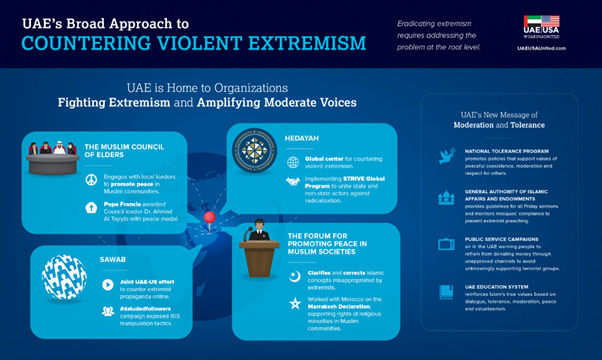
The UAE is dedicated to supporting moderate Islam and countering extremist interpretations of the faith. The country is leading efforts to promote inclusion and compassion through Islam, countering the root cause of extremism and disrupting the messages that lead to radicalization. To this end, the General Authority of Islamic Affairs and Endowments works closely with religious leaders in the UAE to monitor for and prevent extremist preaching in UAE religious centers.
In addition, the UAE is host to the Sawab Center, a bilateral initiative between the UAE and US to counter extremist propaganda and terrorist messaging online. Headquartered in Abu Dhabi, this joint digital media hub utilizes social media platforms to amplify credible voices speaking out against ISIS and counter false extremist claims.
The UAE is also home to Hedayah, a global think tank that provides communities and governments around the world with the tools to increase their capabilities to counter extremism and disrupt terrorist recruitment efforts.
The UAE’s holistic approach to countering violent extremism includes regular coordination with the US government and other foreign allies.
Recent News
UNESCO, UAE begin reconstruction of historic Iraqi church destroyed by ISIS
April 27, 2020
By Samuel Smith
Work has begun to rebuild a Christian church in Iraq destroyed by the Islamic State as part of a partnership between the United Nations Educational, Scientific and Cultural Organization and the Muslim-majority United Arab Emirates.
Dubai to welcome Middle East's first Mormon temple
April 6, 2020
By Shireena Al Nowais
The National
The Middle East's first Mormon temple will be built in Dubai. The Church of Jesus Christ of Latter-day Saints will have a place of worship on the legacy site of Expo 2020.
Abu Dhabi marks interfaith effort a year after Pope’s visit
February 3, 2020
AP
Interfaith leaders gathered on Monday in Abu Dhabi to mark one year since Pope Francis’ historic trip to the Arabian Peninsula, a visit that saw leading Muslim clerics gather alongside the pope to promote co-existence.
As Part of Global Initiative to Promote Peace, Higher Committee of Human Fraternity Unveils Design for the Abrahamic Family House
September 21, 2019
The Higher Committee for Human Fraternity
The Higher Committee of Human Fraternity has come together for a global gathering at the New York Public Library in which they shared with stakeholders their mission to progress a culture of mutual respect and dialogue across all backgrounds, beliefs and nationalities.
UAE vision of interfaith harmony takes shape in Abrahamic House of Fraternity
By Arthur MacMillan
September 21, 2019
The National
It will be a place for religious tolerance and education, bringing faiths together and sending a message of unity to the world. The Abrahamic Family House, which was unveiled in New York on Friday before construction begins on Saadiyat Island next year, will be a physical manifestation of the Document on Human Fraternity signed by Pope Francis and Dr Ahmed Al Tayeb, the Grand Imam of Al Azhar, during the pontiff's visit to Abu Dhabi in February.
Pope: My UAE trip wrote new page in Christian-Islam history
February 6, 2019
Associated Press
Pope Francis says his pilgrimage this week to the United Arab Emirates wrote a “new page in history of the dialogue between Christianity and Islam” and in promoting world peace based on brotherhood.
Pope Francis prays UAE trip will 'bring fruits of peace'
February 5, 2019
The National
Pope Francis has reflected on his visit to the UAE, saying he hopes the trip will lead to peace.
Sheikh Mohamed bin Zayed announces Abrahamic Family House to be built
February 5, 2019
The National
Sheikh Mohamed bin Zayed is commemorating the milestone visit of Pope Francis and the Grand Imam of Al Azhar, by ordering the construction of a building dedicated to inter-faith harmony.
The significance of Pope Francis' UAE visit is impossible to exaggerate
By Reverend Johnnie Moore
February 4, 2019
Fox News (Opinion)
The crown prince of Abu Dhabi, Mohammed bin Zayed, knew exactly what he was doing when he invited Pope Francis to visit the Arabian Peninsula to inaugurate the UAE’s “Year of Tolerance.” The visit, which is underway now, represents a historic first in 1,400 years of Islamic history, and it is impossible to exaggerate its significance.
Why We Invited the Pope to the Arabian Peninsula(link is external)
By Ambassador Yousef Al Otaiba
February 2, 2019
Politico (Opinion)
In 1960, two American missionary doctors went deep into the harsh desert of the Arabian Peninsula to set up a hospital in a mud block building with dirt floors and a palm frond roof. For the Bedouins who lived there and practiced Islam, it would be their first experience with modern medicine—and their first contact with Christianity. Over the next few decades, with the encouragement and support from local tribal leaders, the husband-and-wife medical team would grow the hospital, save many lives and cement a lasting legacy of respect and admiration between Christians and Muslims in what would later become the United Arab Emirates.
Exclusive: Inside the tiny Buddhist temple that serves half a million Dubai worshippers
By John Dennehy
December 31, 2018
The National
The UAE’s Buddhist Monastery, the only such temple on the Arabian Peninsula, granted The National exclusive access into its facilities ahead of the Year of Tolerance. More than 500,000 Buddhists worship freely in the UAE, with the monastery providing this community a place to perform prayers and meditation.
Exclusive: Sheikh Nahyan on the importance of religion as a positive force
By Balquees Bassalom
December 19, 2018
The National
In an exclusive interview with The National, Sheikh Nahyan bin Mubarak Al Nahyan, UAE Minister of Tolerance, speaks about the UAE’s focus on inclusion in the Year of Tolerance. "Our focus should always be on bringing down the walls of misunderstanding and reviving the traditions of tolerance and useful exchange of ideas and concerns,” Sheikh Nahyan notes.
As the Gulf Warms Up to Israel, a Synagogue Grows in Dubai
By Jonathan Ferziger, Alisa Odenheimer
December 5, 2018
Bloomberg
Bloomberg details the UAE’s multinational Jewish community that worships and gathers in Dubai. Jewish residents interviewed in the story describe the UAE as a place of inclusion and mutual respect.
The United Arab Emirates Is A Home For All Faiths In The Middle East
By Reverend Andy Thompson, Pastor Jeramie Rinne
July 26, 2018
Daily Caller (Opinion)
Reverend Andy Thompson and Pastor Jeramie Rinne, both Christian clergy members in Abu Dhabi, describe their experience of religious inclusion in the UAE. “The United Arab Emirates, a small country in the Arabian Gulf, is pioneering a different path,” they write. “In the UAE, people of all faiths are encouraged to worship freely, and many have their own places of worship, supported by the government.”
The first Noel: 60 years of Christmas carols in Abu Dhabi(link is external)
By James Langton
December 24, 2017
The National
This Christmas Eve piece from the The National in 2017 details the UAE’s long history of friendly Muslim-Christian relations. The article traces the UAE’s inclusion of Christians to the arrival of expatriates from Britain, North America and India in the late 1950s.